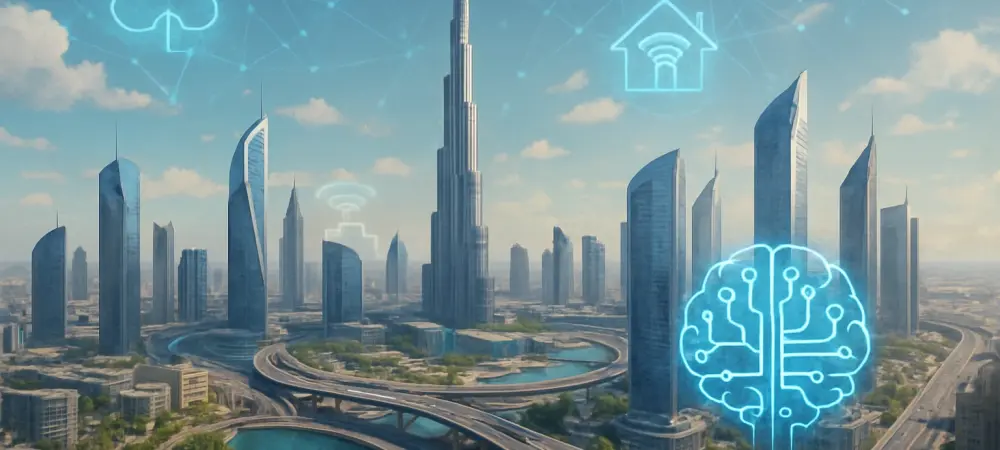Pioneering a Smart Future with Artificial Intelligence
Dubai stands as a beacon of technological ambition in the Middle East, where the integration of artificial intelligence (AI) is not just a vision but a tangible reality shaping the city’s landscape. With over 70% of government services already digitized and AI-driven initiatives transforming urban living, Dubai is setting a global standard for what a smart city can achieve. This remarkable progress sparks curiosity about how AI is being harnessed to address complex urban challenges, from traffic congestion to healthcare delivery. This review delves into the core of Dubai’s AI ecosystem, examining its key features, performance across sectors, and the broader implications of this technological revolution.
Core Features of Dubai’s AI Framework
Infrastructure and Investment as the Backbone
At the heart of Dubai’s AI ecosystem lies a robust infrastructure, underpinned by substantial investments in data centers and high-performance computing. Leading entities like G42 have spearheaded the development of cloud platforms capable of handling complex AI workloads, ensuring that the city can support large-scale projects locally. This foundation enables everything from real-time traffic analysis to advanced medical diagnostics, positioning Dubai as a regional powerhouse for technological innovation.
Public-Private Collaboration Driving Progress
Another defining feature is the seamless collaboration between public and private sectors. Government initiatives provide regulatory support and strategic direction, while private companies bring cutting-edge solutions to the table. This synergy is evident in partnerships like G42’s multi-billion-dollar alliance with Microsoft, which has expanded data-center capacity and introduced global cloud resources to local enterprises. Such collaborations ensure that AI development aligns with both economic goals and societal needs.
Diversity in Sectoral Applications
Dubai’s AI framework stands out for its wide-ranging applications across industries. From healthcare to transportation, cybersecurity to geospatial intelligence, the technology permeates various facets of life. Companies like PureHealth utilize AI for personalized patient care, while Derq focuses on smart mobility to enhance road safety. This diversity ensures that AI addresses specific challenges in each domain, creating a holistic impact on the city’s functionality and quality of life.
Performance Analysis of AI Implementations
Healthcare: Transforming Patient Outcomes
In the healthcare sector, AI has demonstrated impressive performance by improving diagnostic accuracy and patient care models. PureHealth, a key player, leverages data-driven insights to offer tailored medical solutions, significantly enhancing treatment efficiency. Real-world implementations, such as AI-assisted mental health services, showcase the technology’s potential to address pressing public health needs, though scalability across diverse demographics remains a concern.
Transportation: Enhancing Safety and Efficiency
Transportation is another area where AI excels, with solutions like Derq’s computer vision models predicting and preventing road accidents. By collaborating with local authorities, these systems have reduced traffic incidents, contributing to safer urban mobility. The performance here is notable for its immediate impact on daily life, although challenges in integrating AI with existing infrastructure sometimes hinder broader adoption.
Cybersecurity and Geospatial Intelligence: Securing and Planning
On the cybersecurity front, firms like DarkMatter have fortified Dubai’s digital landscape with AI-driven threat detection and secure communications. Similarly, Bayanat’s use of satellite data for urban planning and emergency response highlights AI’s role in geospatial intelligence. Both sectors show strong performance in protecting critical systems and enabling sustainable development, yet the high cost of maintaining such advanced technologies poses a persistent hurdle.
Challenges Impacting AI Scalability
Technical and Talent Constraints
Despite its strengths, Dubai’s AI ecosystem faces technical challenges, including the need for a skilled workforce to sustain growth. While training initiatives are underway, the gap in local expertise often slows down project timelines. Addressing this requires a long-term focus on education and talent development to ensure the ecosystem can keep pace with global advancements.
Regulatory and Privacy Concerns
Regulatory frameworks and data privacy issues also present obstacles. As AI systems handle vast amounts of sensitive information, ensuring compliance with international standards is crucial. Ongoing efforts to establish clear guidelines aim to mitigate these risks, but balancing innovation with security remains a complex task that demands continuous attention.
Financial Barriers to Expansion
The financial burden of scaling AI technologies across industries cannot be overlooked. High costs associated with infrastructure upgrades and system integration often limit smaller enterprises from participating in this transformation. Government subsidies and strategic investments are helping to alleviate this issue, though broader access to funding is still needed to democratize AI benefits.
Reflecting on Dubai’s AI Journey
Looking back, Dubai’s journey with artificial intelligence marks a transformative chapter in urban and technological evolution. The city’s commitment to building a robust infrastructure, fostering impactful collaborations, and applying AI across diverse sectors stands as a testament to its vision of becoming a global smart city benchmark. Challenges like talent shortages and regulatory complexities are acknowledged, yet they do not overshadow the remarkable strides made in healthcare, transportation, and cybersecurity.
Moving forward, the next steps involve prioritizing talent cultivation through enhanced educational programs and international partnerships to bridge expertise gaps. Additionally, refining regulatory frameworks to protect data privacy while encouraging innovation is essential. Finally, expanding financial support for smaller players promises to ensure that AI’s benefits reach all corners of society, solidifying Dubai’s position as a leader in technological progress on the global stage.

